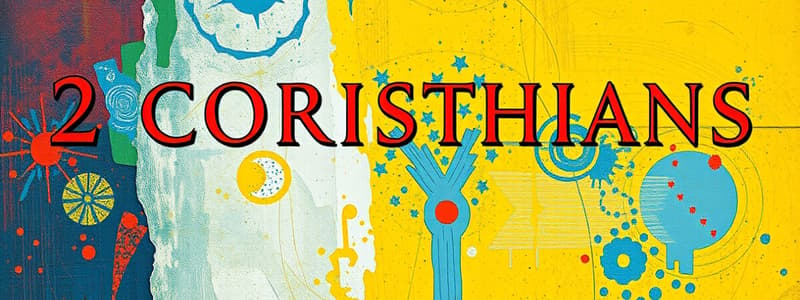Podcast
Questions and Answers
The term 'teacheth' in 2 Corinthians 2:13 comes from the Greek word 'didaktos', meaning 'impart, instruct.'
The term 'teacheth' in 2 Corinthians 2:13 comes from the Greek word 'didaktos', meaning 'impart, instruct.'
True (A)
The Greek term 'Sunkrinō' means 'to analyze or evaluate'.
The Greek term 'Sunkrinō' means 'to analyze or evaluate'.
False (B)
The Holy Spirit's teachings aim to create a division between God and individuals.
The Holy Spirit's teachings aim to create a division between God and individuals.
False (B)
Human writers are considered the originators of the scriptures.
Human writers are considered the originators of the scriptures.
The phrase 'moved by' in 2 Peter 1:21 indicates that human beings were solely responsible for writing the scriptures.
The phrase 'moved by' in 2 Peter 1:21 indicates that human beings were solely responsible for writing the scriptures.
The goal of the Holy Spirit's instruction is to implant teachings within individuals.
The goal of the Holy Spirit's instruction is to implant teachings within individuals.
The Bible's trustworthiness is questioned because it has human writers.
The Bible's trustworthiness is questioned because it has human writers.
The keyboard I use to write is considered the author of my books.
The keyboard I use to write is considered the author of my books.
Flashcards are hidden until you start studying
Study Notes
Teaching and the Role of the Holy Spirit
- The term "teacheth" in 2 Corinthians 2:13 originates from the Greek word "didaktos," meaning "impart" or "instruct."
- The Holy Spirit not only conveys words but also shares Divine thoughts, intentions, and objectives, aiming to unite believers with God through His teachings.
- The process of instruction implies that the Holy Spirit's role is to implant these teachings within individuals.
Comparing Spiritual Truths
- "Comparing" is derived from the Greek word "Sunkrinō," which means "to bring together."
- In the context of the phrase "comparing spiritual things with spiritual," it underscores the careful selection of words to express spiritual truths.
- This highlights the Holy Spirit's diligence in ensuring accurate communication of God's word.
Authorship of the Scriptures
- The trustworthiness of the Bible is often questioned due to its human authors, suggesting its imperfection.
- However, the true authorship involves divine inspiration, separating human transcribers from the origin of the message.
Divine Inspiration Explained
- 2 Peter 1:21 clarifies that while holy men spoke and wrote as they were "moved by" the Holy Ghost, they are not the original authors of the scriptures.
- The Greek term "phero," meaning "to bring," indicates the Holy Spirit’s active role in guiding human writers.
- The word "by" comes from the Greek “hypo,” indicating being under the influence or authority of the Holy Spirit.
The Reliability of Scripture
- Critics argue against the Bible's reliability due to human flaws in its authors.
- Despite the imperfections of human prophets, the Holy Spirit's guidance ensures the scripture remains true and without error.
- This process is similar to an author using tools (like a computer keyboard) to produce work while remaining the true source of creation.
Studying That Suits You
Use AI to generate personalized quizzes and flashcards to suit your learning preferences.




